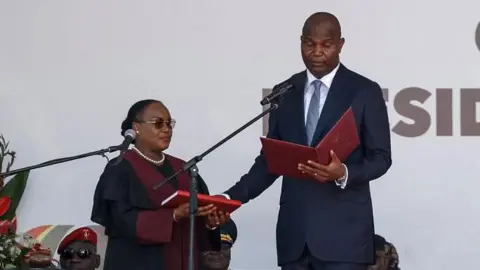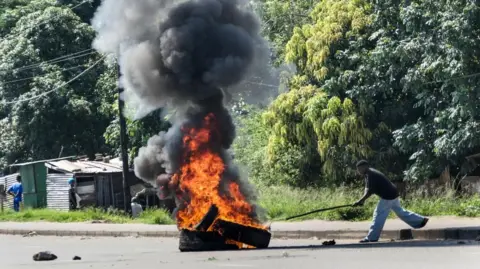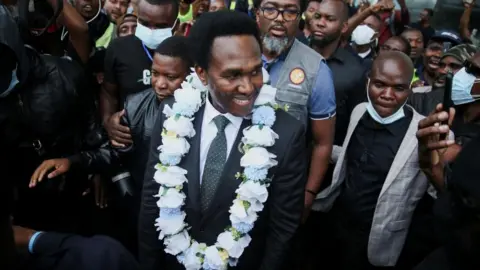 AFP
AFPMozambique’s new president, Daniel Chapo, was sworn in at a low-key ceremony in the capital, Maputo, marred by an opposition boycott following a hotly contested election.
Most businesses in Maputo were closed and the streets largely deserted after defeated presidential candidate Venâncio Mondlane called a national strike in protest.
In his first presidential speech, Chapo, 47, pledged to “dedicate all my energies” to promoting unity and human rights in a nation marked by post-election violence.
A local civil society group says more than 300 people have been killed in clashes with security forces since October’s elections.
Chapo won with 65% of the vote, extending the Frelimo party’s 49-year reign.
Mondlane – who ran for office as an independent – came second with 24% of the vote. He rejected the result as rigged and called for an Inauguration Day strike “against the thieves of the people.”
Addressing around 2,500 guests at the highly guarded ceremony, Chapo said that “together we will restore patriotism and pride in being Mozambican.”
“Mozambique cannot remain hostage to corruption, nepotism and incompetence,” he added.
Police fired shots to disperse the crowd in front of Independence Square, where the ceremony was being held, as Chapo’s motorcade then left.
The crowds were mostly composed of Mondlane supporters, but among them were also some Chapo supporters. Both groups had already attempted to enter the room, but were prevented from doing so.
“Is this a wedding with private invitations? We want to see the president take the oath of office but we have been told we can’t,” Maputo resident Paulu Hamuze told the BBC.
Mondlane’s election campaign was supported by a small opposition party, which responded to his call to boycott the inauguration.
Mozambique’s two main opposition parties – Renamo and MDM – also boycotted the swearing-in because they also do not recognize Chapo as the rightful winner.
Chapo succeeds Filipe Nyusi, who resigned at the end of his two mandates.
Even those in Mozambique who wish Chapo well openly question his legitimacy or his ability to solve the problems he has identified.
“Chapo is someone I admire enormously,” civil society activist Mirna Chitsungo told the BBC.
“I worked with him for four years. I know his desire to act, his openness to dialogue and his willingness to follow the recommendations of civil society on the ground.”
“However, he assumes illegitimate power. This stems from a fraudulent electoral process… He takes power in a context where the people do not accept him.”
“He will face many enemies”
In addition to convincing a hostile public, Chapo will also have to ensure economic recovery and put an end to corruption, as he promised during the election campaign.
“Chapo will face many enemies as it appears Mozambique is run by cartels including book cartels, drug cartels, sugar cartels, drug cartels, kidnapping cartels, mafia groups “, explains analyst and investigative journalist Luis Nhanchote.
“He needs a strong team of experts, ready to join him in this crusade to meticulously dismantle the groups,” he adds.
“But first he must calm the Mozambicans and do everything in his power to restore peace to the country.”
Daniel Francisco Chapo was born on January 6, 1977 in Inhaminga, a town in the province of Sofala, the sixth of ten siblings. It was during Mozambique’s civil war, and the armed conflict forced his family to move to another neighboring district.
His secondary education in the coastal town of Beira was followed by a law degree from Eduardo Mondlane University and then a master’s degree in development management from the Catholic University of Mozambique.
Now married to Gueta Sulemane Chapo, with whom he has three children, Chapo is also said to be a practicing Christian and a fan of basketball and football.
Many current and former colleagues describe Chapo as a humble, hard-working and patient leader.
 EPA
EPABefore becoming the presidential candidate of the ruling Frelimo party, he was a radio and television presenter, notary, university professor and provincial governor before rising to the position of Secretary General of Frelimo.
Speaking at his recent birthday celebration, Chapo himself acknowledged the daunting challenge facing him as president.
“We must restore our country economically. It is easy to destroy it, but building it is not an easy task.”
National reconciliation, the creation of more jobs, electoral law reform and decentralization of power are at the top of his agenda, he said.
But how successful can he be without the support of much of the country?
At the very least, he will mark a change from outgoing President Felipe Nyusi, whose back Ms Chitsungo believes many Mozambicans will be happy to see.
“Chapo is a figure of dialogue and consensus, not one to perpetuate Nyusi’s violent style of governance. He has the potential to negotiate with Mondlane.
“Even though Chapo may not fully meet all of Mondlane’s demands, I think he could meet at least 50% of them,” Chitsungo adds.
Mondlane – a part-time pastor who insists he was the real winner in the polls – is said to have taken refuge in one of Maputo’s hotels after returning from a self-imposed exile.
It’s unclear what protection he gets there, or who pays for it.
He claims that last week, while visiting a market in Maputo, a nearby vendor was shot dead, echoing the murder of two of his close associates in October.
As the mastermind of nationwide protests against the disputed election result, he is now seen by many as the voice of the voiceless. However, at present, the president-elect’s camp is not publicly addressing him.
Still, listening to public grievances and demands, and sometimes ignoring orders from his ruling Frelimo party, will be key to Chapo’s success, analysts told the BBC.
Finding a way to engage constructively with Mondlane would undoubtedly provide a boost, they say.
 Reuters
ReutersTo convince the public, Chapo may also have to say no to “high elite salaries and social benefits, some of which are 10 times higher than Mozambique’s minimum wage,” says Mr. Nhachote.
Moreover, if Chapo is to have any chance of ending the broader political crisis, he will need the support of others to make lasting structural changes, says prominent cleric Rev. Anastacio Chembeze.
“Perhaps we should remain skeptical that one person can solve Mozambique’s challenges – change must start within the system itself.
“We have to fight for a separation of powers within the state apparatus, international monopolies have huge interests in the country and we have serious ethical problems within the political elites to address them.”
Once in power, Chapo is expected to fire the country’s police chief, Bernadino Rafael, analysts told the BBC. He denies any wrongdoing but is seen by some as the mastermind behind the brutal response to post-election protests.
They say they want to replace him with a successor who “respects human rights” and respects legal and international standards. Another suggestion put forward by analysts is the appointment of a new attorney general.
Chapo will be the first president of Mozambique not to have fought in the war of independence.
“He is part of the new generation. Part of his journey is completely different from his predecessors: he was born in a country liberated by them,” explains Mr. Nhachote.
“If he wants to leave a real mark on history, he must challenge these icons of the past. If he fails to do so, I am sure he will only run for one term.”
You might also be interested in:
 Getty Images/BBC
Getty Images/BBC


